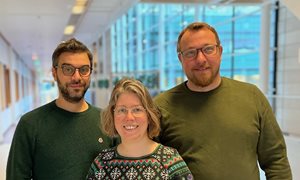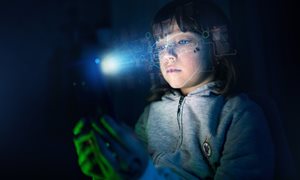
Thanks to eleven million euros in funding, researchers will develop AI capable of providing advice on various conditions affecting the brain or the intestines, such as depression, anxiety and obesity. The AI will also investigate connections between these conditions. The project is led from Italy, with Radboud university medical center receiving the largest share of the budget of all partners.
The future of healthcare involves a computer system that learns from vast amounts of medical data and subsequently provides advice tailored to individual patients. This could include comparing an MRI scan with scans and complete medical records from similar cases. Technically challenging aspects of such a system include dealing with diverse types of data, such as text, blood values, medical images, and genetics.
An international group of researchers, supported by eleven million euros from the European Commission, will develop a computer system capable of connecting and analyzing all these types of data. Their focus is on intestinal and brain disorders, because these organs strongly influence each other, making connections in the “gut-brain axis” highly interesting. The system will search for patterns in the multimodal data, such as the co-occurrence of specific conditions or states.
Intestinal bacteria
In Nijmegen, a considerable amount of data is already available. In a previous EU-funded project, Francesco Ciompi collected 20,000 digitized microscopy images of intestinal polyps and biopsies. Annemarie Boleij and Nils Kohn use analyses of intestinal bacteria, genetic information and a significant number of MRI brain scans gathered in the Healthy Brain Study funded by the Reinier Post Stichting. The researchers will link these data together, and the entire EU project will explore even broader aspects, including air pollution.
The computer system will consist of algorithms that learn from data. These algorithms will be hosted on the Grand Challenge platform, developed at Radboudumc. Francesco Ciompi explains: ‘The Research Software Engineering team originally built this platform for global competitions to develop the best algorithm for analyzing medical images such as CT or MRI scans, but the platform can also host algorithms and data, which can be made accessible in various forms. Currently, the platform supports medical images and digital pathology slides, but within the project, we will expand with other data modalities, such as genetics data.’
Virtual visits
The new algorithms will be integrated into the platform, but not all the data the system learns from will be online. ‘People are increasingly using 'federated' working methods to both train AI algorithms and to access data. In federated learning for example, the algorithms virtually visit various hospitals through the platform and learn on-site from medical data without the data leaving the hospital’, says Ciompi.
Once the algorithms have learned enough from their virtual visits, they can assist doctors in the future. Ciompi: ‘The computer system can, for example, compare multimodal data from the gut and the brain of an individual patient, such as an fMRI scan, a biopsy from the intestine, and metabolome sequences from fecal samples, with scans and medical records of similar cases. The system can then support clinicians in their diagnosis, predict prognosis, determine any links with other conditions, and suggest treatment options.’
More Information
The project HEREDITARY receives 11 million euros in funding, with almost 1.3 million euros allocated to Radboudumc. The project is coordinated by the University of Padova, Italy. The investigated conditions include brain diseases such as ALS, MS, Parkinson's, depression, anxiety, ADHD and Alzheimer's, as well as intestinal disorders like IBD, diabetes and obesity.
-
Want to know more about these subjects? Click on the buttons below for more news.
More information
Annemarie Eek

wetenschapsvoorlichter





